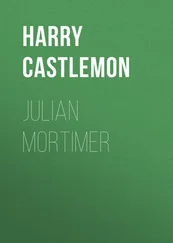Harry Castlemon - Don Gordon's Shooting-Box
Здесь есть возможность читать онлайн «Harry Castlemon - Don Gordon's Shooting-Box» — ознакомительный отрывок электронной книги совершенно бесплатно, а после прочтения отрывка купить полную версию. В некоторых случаях можно слушать аудио, скачать через торрент в формате fb2 и присутствует краткое содержание. Издательство: Иностранный паблик, Жанр: foreign_prose, на английском языке. Описание произведения, (предисловие) а так же отзывы посетителей доступны на портале библиотеки ЛибКат.
- Название:Don Gordon's Shooting-Box
- Автор:
- Издательство:Иностранный паблик
- Жанр:
- Год:неизвестен
- ISBN:нет данных
- Рейтинг книги:5 / 5. Голосов: 1
-
Избранное:Добавить в избранное
- Отзывы:
-
Ваша оценка:
- 100
- 1
- 2
- 3
- 4
- 5
Don Gordon's Shooting-Box: краткое содержание, описание и аннотация
Предлагаем к чтению аннотацию, описание, краткое содержание или предисловие (зависит от того, что написал сам автор книги «Don Gordon's Shooting-Box»). Если вы не нашли необходимую информацию о книге — напишите в комментариях, мы постараемся отыскать её.
Don Gordon's Shooting-Box — читать онлайн ознакомительный отрывок
Ниже представлен текст книги, разбитый по страницам. Система сохранения места последней прочитанной страницы, позволяет с удобством читать онлайн бесплатно книгу «Don Gordon's Shooting-Box», без необходимости каждый раз заново искать на чём Вы остановились. Поставьте закладку, и сможете в любой момент перейти на страницу, на которой закончили чтение.
Интервал:
Закладка:
When Don said this he meant every word of it; but after he had been at the academy a few weeks, Bert noticed that he never gave expression to such ideas as these. He learned how to keep his back turned toward a room when he had reason to believe that the owners desired to “take French” for the evening; and when he was certain that they were out of harm’s way, he could open the door of that very room, and without much stretching of his imagination convert the “dummies” that occupied the beds into living, breathing students. It soon became known to a certain class of boys that the Planter was a “brick,” who would rather get into trouble himself than report any of his schoolmates; and they were not slow to take advantage of his good-nature. That was the term the students applied to his neglect of duty; but the superintendent called it disobedience of orders, and Don was punished accordingly.
“What was that noise?” exclaimed Bert, suddenly.
“It sounded like a drum,” answered Don.
And that was just what it was. A couple of drummers were walking around the building, every now and then giving their instruments a single tap.
“It certainly means something,” said Bert, with no little anxiety in his tone; “but I am all in the dark.”
So was Don. He was about to propose that they should step out into the hall and ask the sentry to enlighten them, when the door suddenly opened and that dreaded functionary thrust his head into the room.
“I say, Plebe,” he exclaimed, nodding to Don, “give us your name, will you?”
Don wonderingly complied, and the sentry drew a note-book from his pocket and wrote something in it.
“Very unpleasant piece of business,” said he, “but it can’t be helped. Orders are orders, as you will find before you have been here a great while. Next time keep your ears open.”
“Why, what’s the matter?” inquired Don. “Have we done anything wrong?”
“I should say so. Why didn’t you douse your glim? Did you not hear the signal?”
“We heard a drum, if that’s what you mean,” said Bert.
“That was ‘taps,’ and it meant ‘lights out.’ Put that lamp out at once.”
“We’ll do it just as soon as we get ready for bed,” replied Bert, jumping up and pulling off his coat.
“Put it out, I tell you,” exclaimed the sentry. “Put it out now , and undress in the dark, as the rest of the fellows do. You had better take my advice and slumber lightly, for after the morning gun is fired you will have just six minutes in which to get into your clothes and fall in for roll-call. Pleasant dreams.”
“Humph!” said Bert, as the sentry closed the door and went out into the hall to inspect the other rooms. “How can a fellow’s dreams be pleasant when he knows that he is going to be reported in the morning? This is a bad beginning, Don. Although we have not been here twenty-four hours, we have got ourselves into trouble already.”
This reflection worried Bert, who always tried hard to obey the rules of the school he attended, and considered himself disgraced if he were taken to task for violating any of them; but it had no more effect upon Don than water has on a duck’s back. He tumbled into bed and slept soundly, while Bert, who was very much afraid that he might not hear the morning gun, lay awake during the greater part of the night. Toward morning he sank into a troubled slumber, from which the solemn booming of the field-piece aroused him.
He and Don were out on the floor and putting on their clothes before the deep-toned reverberations that came from the hills on the other side of the river had fairly died away. There was no time lost in stretching and yawning – not a second wasted in waking up. The drums were beating in the drill-room, and the fifes were shrilly piping forth the first strains of the three tunes that constituted the morning call. Before the second tune was finished, Don and Bert, following the lead of the crowd of students they found in the hall, ran into the drill-room and took their places in line.
There were four companies in all, each one numbering, when the school was full, seventy-five members. They were all officered by boys, the highest in rank being the lieutenant-colonel, while the superintendent of the academy, or one of the instructors, acted as commandant of the battalion. The companies were drawn up on the four sides of the spacious drill-room, in which all the battalion and company exercises and ceremonies were held during bad weather, the members standing at “parade rest.” In front of each company stood the upright, soldierly figure of the first sergeant, note-book in hand. Behind him stood his boy captain, while the officer of the day, his arms folded across his breast, critically surveyed the scene from his post near the door. The instant the last notes of the reveille died away business commenced.
“Attention, company!” shouted all the first sergeants in a breath; whereupon the students brought their heels in line, dropped their hands by their side, turned their eyes to the front, and assumed the position of a soldier.
The roll was called in less than two minutes, and after the first sergeants had reported to their captains, and the captains had reported to the adjutant, and the adjutant had reported to the officer of the day, whose duty it was to report the absentees to the superintendent, the guards for the day were detailed, the ranks were broken, and the students hurried away to wash their hands and faces, comb their hair, and put their rooms in order for morning inspection. After that came two hours of hard study. Then the sick-call was sounded, followed shortly afterward by the enlivening strains of “Peas upon the Trencher,” which was the summons to breakfast. The different companies were marched to and from the dining-hall by their quartermaster-sergeants, and when the ranks were broken the students were allowed an hour to “brush up” on their lessons for the day, or to stroll about the grounds and watch guard-mount. At nine o’clock the bugle called them to their respective recitation-rooms, and from that time until one they were kept at work at their books. After dinner an hour was allowed for rest and recreation. From two until half-past three there were more recitations, followed by a long and fatiguing drill, and then liberty until sunset. Then came the dress-parade of the battalion; and when that was ended the day’s work was over with everybody except the guards and those who were behind with their lessons for the next day. After supper and another hour of recreation, the bugle called “to quarters,” and that was a sound that nobody liked to hear. It meant that all the fun was over for that day, that every boy must go to his room at once and keep quiet after he got there, under penalty of being reported by the sentry who had charge of that floor.
After this description of the routine of study and drill that was pursued at the academy, the reader will understand how Don Gordon passed the most of his school-days during the next four years. How he passed his vacations it is the purpose of this series of books to relate. It will be seen also that he was allowed very little time in which to study up plans for mischief. In fact he did not think of such a thing yet , for he had come there firmly resolved to do his best, and to win a record for himself that his father should be proud of; but still he did feel very revengeful while he and his brother were standing in front of the superintendent’s desk, listening to the sharp reprimand that was administered to them for neglecting to extinguish their light at taps. This was the same “good-natured gentleman” who had greeted them and their father so cordially when they visited his camp during the previous summer, but he did not talk as he did then. He used cutting words, and laid down the law in tones that had made more than one culprit tremble. Don did not mind it in the least, for he was used to being scolded by his teachers; but when he saw how Bert took it to heart, he became so angry that he could hardly hold his peace.
Читать дальшеИнтервал:
Закладка:
Похожие книги на «Don Gordon's Shooting-Box»
Представляем Вашему вниманию похожие книги на «Don Gordon's Shooting-Box» списком для выбора. Мы отобрали схожую по названию и смыслу литературу в надежде предоставить читателям больше вариантов отыскать новые, интересные, ещё непрочитанные произведения.
Обсуждение, отзывы о книге «Don Gordon's Shooting-Box» и просто собственные мнения читателей. Оставьте ваши комментарии, напишите, что Вы думаете о произведении, его смысле или главных героях. Укажите что конкретно понравилось, а что нет, и почему Вы так считаете.












